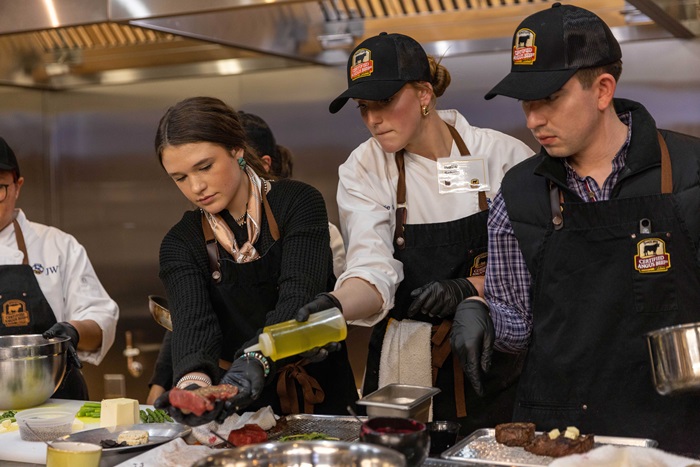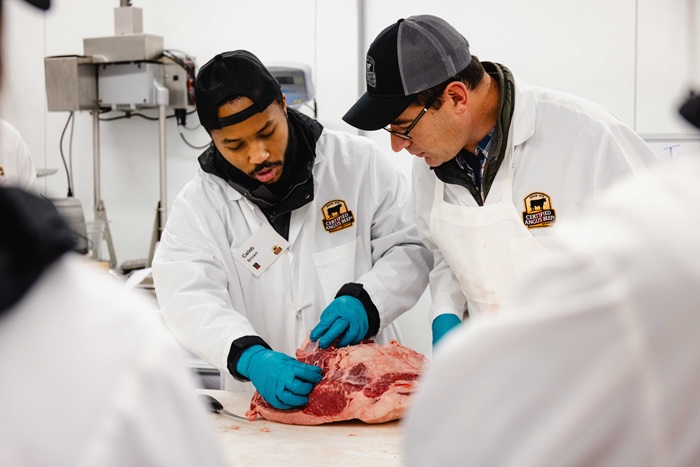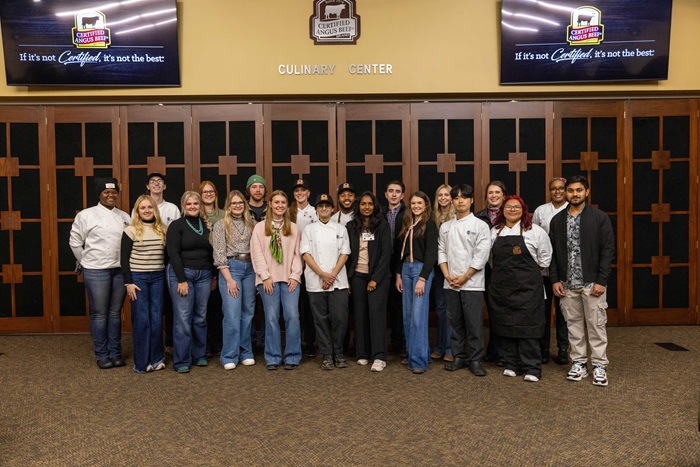Creating a More Connected Beef Community
Aspiring ranchers and chefs discover they are not so different in Wooster, Ohio.
April 14, 2025


Twenty students merged for three days of learning the similarities of ranchers and chefs. From the meat lab to an Angus farm, attendees gained greater appreciation for the other’s craft.
At first glance, a rancher’s boots and the chef’s apron seem worlds apart. But during the Certified Angus Beef (CAB) Connecting the Culinarian and Rancher event, those differences faded. A shared purpose and passion at the heart of the beef industry emerged.
The 2024 event brought together ranchers from across the United States and culinary students from Johnson & Wales University (JWU). It highlighted how both ends of the supply chain rely on sustainability, stewardship and storytelling to manage their businesses.
By investing in the next generation this way, CAB strengthens relationships across the supply chain. These efforts are part of the brand’s sustainability platform, which balances environmental stewardship, economic viability and social responsibility.
Relationships are at the heart of the beef industry, and from raising to serving the best beef, the brand is invested in the people behind each step.
“It’s amazing how similar ranchers and chefs really are. We both put in the hours, take pride in our work and share the goal of creating something meaningful for others to enjoy.” — Olivia Rooker, an agricultural communications student at Oklahoma State University (OSU)
From pasture gate to chefʼs plate
The first day began in a meat lab, where students learned about lesser-known cuts — many just as flavorful as a ribeye or filet. The quality of these cuts tells a story of the care ranchers give, and the chefs who transform their work into memorable meals.
Chef Vinnie Cimino, operating partner and executive chef at Cordelia in Cleveland, Ohio, joined the group to share how storytelling shapes his restaurant’s menu, especially the CAB brand items.
“It’s our duty to appreciate the things farmers and ranchers do,” he said. “Without them, we wouldn’t have the great beef to serve today.”

Next, students visited Chippewa Valley Angus Farm to see the inner workings of a cattle operation. There, culinary students learned from the family raising Angus seedstock what it takes to meet customer demand.
For many culinary students, including JWU sophomore Caleb Brown, this was their first in-depth look at what raising cattle looks like daily.
“Seeing the connection between ranchers and their land really opened my eyes,” Brown says. “It’s not just about raising cattle; it’s about ensuring we care for the environment and the animals so future generations can continue the tradition.”
“I previously thought most ranching was on large-scale operations, but now I understand the process spans a longer timeline,” says Katie Scheive, JWU student. “Through conversations with ranching students, I realized it’s not just a job, but a lifestyle.”
The chefs, who have spent their college days crafting flavors and perfecting dishes, began to understand the ranchers’ commitment for the land and cattle. In turn, the ranchers admired the chefs’ dedication to elevating ingredients and crafting meals. Each group saw the commitment the other brought to their work, building mutual respect for their roles in the beef industry.

Working together
Back in the kitchen, ranchers tied on aprons as culinarians fired up the stoves. Together they collaborated and experimented with the cuts they had studied earlier in the meat lab, turning their new expertise of beef cuts to create unique dishes.
Breaking bread, the students enjoyed the meal they just created together.
“I never thought I would get an opportunity to engage in an experience like this. The knowledge I’ve gained has fueled my fire and passion for working in the agricultural industry, but also to share my story with others to do the same thing,” Rooker explains.
A unique bond was forged between these chef and ranch students in just a few days, as they were united by a shared respect for the beef, the process and the people behind each steak, despite their different roles.
“We hope that our culinary students walk away with confidence in how Certified Angus Beef is raised and inspired to bring high-quality beef dishes to their guests’ tables for years to come,” says Ashley Breneman, CAB chef. “We hope our ranchers leave with a newfound respect for chefs and a deeper passion for raising more high-quality beef.”
Just as boots and aprons are essential to their work, ranchers and chefs each play crucial roles. One lays the foundation for premium beef; the other prepares it to be enjoyed.
While they serve at opposite ends of the supply chain, attending events like this arms them with a mutual respect and knowledge to be brand ambassadors throughout their careers.

Investing in Tomorrow’s Leaders
Every day, cattlemen and women are faced with decisions that affect their future. One way CAB supports the next generation of producers is investing in those students who will one day lead the industry — whether that’s on the ranch, feedyard, packer or restaurant. While education is a powerful tool used to create brand ambassadors of all ages, the brand also invests in students who have a passion for the livestock and meat sciences.
Colvin Scholarship Fund: In honor of Louis M. “Mick” Colvin, a brand founder, Colvin Scholarships are rewarded for students who express goals and interests to make the beef business better. Scholarships are available in three categories: agricultural production, undergraduate and graduate. Apply by April 4, 2025, to be eligible.
Colorado State University (CSU) Graduate Fellowship: A graduate student at CSU researching meat science, animal science, animal care or sustainability is eligible. This fellow interacts with the brand’s production team to share his or her research and other relevant beef quality research updates.
VanStavern Beef Quality Award: Awarded during the American Meat Science Association Reciprocal Meat Conference, this recognizes a student’s research relevant to high-quality beef supply or demand. This award honors Bob VanStavern, the Ohio State University meat scientist who established the brand’s original carcass specifications.
Internships: Students with an interest in communications or marketing spend the summer in Ohio at the CAB home office building their on-the-job experience. From storytelling on a variety of platforms to working on brand partner’s marketing, the CAB team hires interns to join the team and contribute to important projects and build their résumé job experience.
Youth Beef Leaders Seminar: A three-day beef experience at The Culinary Center in Ohio. College students with backgrounds or an interest in working in the beef industry learn from the CAB team about how premium beef adds value to each segment of the beef supply chain. This event takes place in December, but it is on pause for 2025.
For more information visit: www.certifiedangusbeef.com/en/brand/for-students
Topics: Consumer , Association News , Events
Publication: Angus Journal




